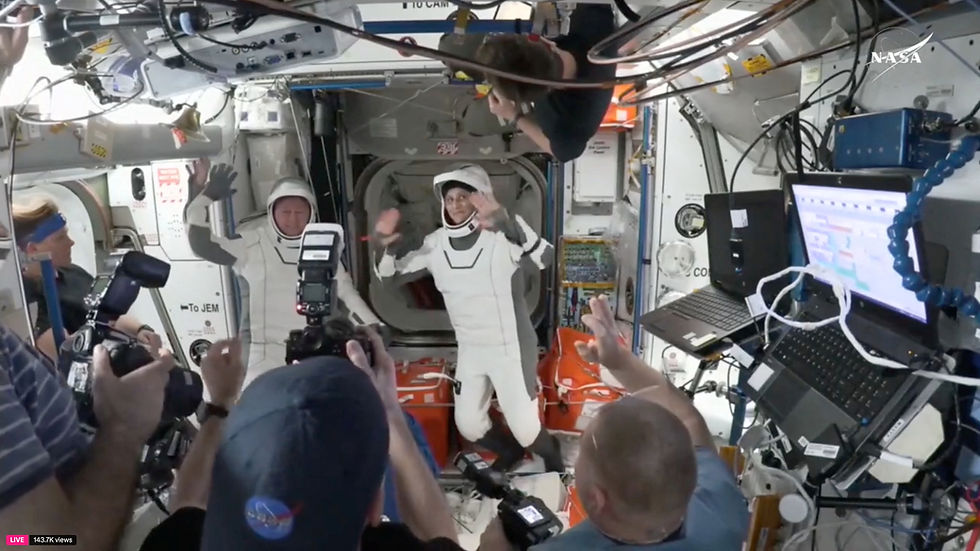Olympics-Prince Feisal champions member input in IOC presidential bid
- News Agency
- Dec 17, 2024
- 3 min read

LONDON - The promise of a more democratic International Olympic Committee with greater input from members is key to Prince Feisal Al Hussein of Jordan's bid for the top Olympic job, the IOC presidential candidate has told Reuters.
One of seven candidates running for the prestigious post being vacated by German Thomas Bach after 12 years in charge, the 61-year-old also says a more flexible approach to hosting the Games is another vital element that needs to be addressed as the movement enters a new phase.
Prince Feisal, a member of the Executive Board, is up against World Athletics chief Sebastian Coe, Zimbabwe's Sports Minister Kirsty Coventry, Juan Antonio Samaranch Jr., international cycling head David Lappartient, Japanese gymnastics leader Morinari Watanabe, and Swedish Olympic newcomer Johan Eliasch in the March 2025 election.
Prince Feisal's campaign focuses on three pillars: imagination, integrity, and inclusion.
"I think that's a good way forward and I'm hoping that... most of the members will look at the manifesto and say, 'okay, that's somebody I can see as the President of the IOC and I like what he's thinking. I like his style'," he told Reuters in an interview in London.
"I believe that I've always had credibility because I speak very frankly. I don't try and say things that I think people want to hear. I say what I really believe because I think you must be frank and honest if you want to build a relationship."
He underlines his credentials of candour, saying the full potential of the IOC membership is not being utilised. Critics argue that under Bach, decision-making has been centralised to the Executive Board.
Prince Feisal says he will ensure the entire membership's voices are heard if he is elected.
The IOC generated more than $6.7 billion in revenues between 2017 and 2021, including $4.544 billion from broadcasters and $2.295 billion from top sponsors, its second-biggest income source.
"We are not fully utilising the potential of the IOC... the question is, how can we unlock that potential?" he said.
"A key part of this involves inclusivity—bringing them into the fold, ensuring their voices are heard, and making them feel they are an integral part of the process. It's important that they don’t feel decisions are being dictated from the top down, but rather that their perspectives matter, and they can actively contribute."
FLEXIBILITY IN HOSTING DATES
The IOC will hold the election at its Session in Greece in March 2025, with each of the 100-plus members having one vote each. Prince Feisal also advocated for flexibility in hosting dates for the Games, acknowledging the impact of climate change.
"Part of the whole principle of Olympism is universality -- so you can have it in different places. My concern right now is that when you see global warming or climate change, there are going to be fewer and fewer countries that can safely host the Olympic Games (in its traditional window).
"The way it's structured right now limits the number of countries that can do it. I would sit with the International Federations and others in the Olympic movement and say, is there flexibility in the calendar so that we can open the possibility for different countries to host."
A decision to allow different dates for staging Summer Games outside the traditional Northern Hemisphere summer months would benefit countries such as Qatar and Saudi Arabia, which cannot host the Games in July or August due to their desert climates. Both have shown interest in hosting as early as 2036.
Finessing such political moves will demand diplomatic skill, and Prince Feisal believed his background equips him well for the challenges.
The younger brother of King Abdullah II, he played a key role in modernising Jordan's military and is a strong advocate for sports and youth development, as well as initiatives promoting peace through sports.
"Culturally, I'm Eastern, but I've been Western educated as well, so I understand the difference in culture and... that has helped me in a lot of the work that we do in being able to bridge gaps," he said.
The IOC's past presidents have all been male and were either European or American.
"My military career taught me a lot about leadership. I have the experience of working across different agencies and stakeholders to build a strong policy based on consensus.
"As my father said, we all want to leave hope in the world. That's why I put my name forward – this is a continuation of what my life has been. I believe sports can do so much good if we unlock the potential in the right way."
(Editing by Christian Radnedge)









.png)








Comments